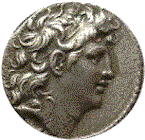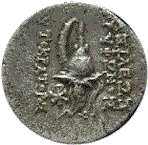Rebel Hellenistic general & ally
of Alexander
Balas who used the latter's death (145
BCE) to seize royal power for
himself. He set Balas' son on the throne as Antiochus
VI, though he was just a young child, & acted as his regent. In 143
BCE he trapped Judah
Maccabee's brother Jonathan
at Ptolemaļs, ordered
his execution & attempted to annex Judea.
He then murdered Antiochus (142
BCE) & proclaimed himself king.
To avenge Jonathan's
death, Simon
-- the oldest surviving Hasmonean brother -- forged an alliance with
Trypho's Seleucid rival, Demetrius
II. After Demetrius was assassinated, his younger brother,
Antiochus VII, finally drove Trypho into exile (138
BCE) where he committed
suicide. While Trypho never consolidated his power & was not
recognized as a legitimate monarch by neighboring rulers, he proved to be a
vigorous & volatile catalyst, precipitating political events that
destabilized other regimes & ultimately undermined Seleucid
power.
References: 1
Maccabees
11:39-40,
54-57; 12:39-52;
13:1-32;
14:1;
15:10-14,
25, 37-41.
Josephus, Antiquities
13.131-134.
Livy, History of Rome 52,
55
[periochae].
Justin, Epitome
36.1;
39.1.
Strabo, Geography 16.2.10.
Appian, Roman
History: Syrian War 11.68.
Other resources on line:
![]()
![]()


![]()
![]()
![]() Perspective on the
World of Jesus
Perspective on the
World of Jesus ![]()